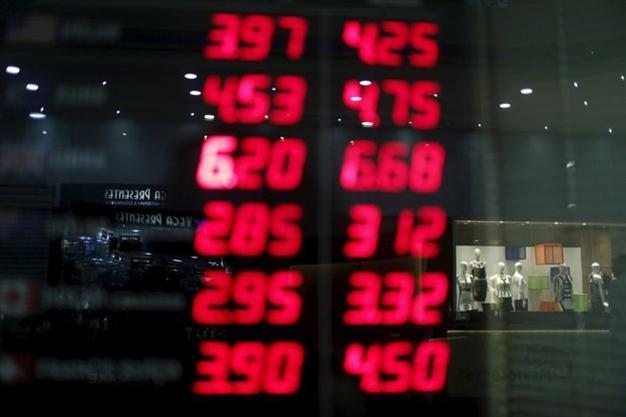Turkish Lira, stocks rocket after AKP’s election victory
ANKARA

REUTERS photo
The Turkish lira and stocks soared Nov. 2 after the Justice and Development Party (AKP) was returned to power in a stunning weekend election victory.The lira jumped almost four percent to 2.79 to the dollar in early afternoon trade on Nov. 2, after earlier gaining 4.4 percent in the morning to its highest level in seven years. The currency had tumbled more 25 percent this year on concerns about Turkey’s faltering economy and the political turmoil.
The main index on the Istanbul stock exchange, the BIST, was up 5.5 percent at 83,831 points.
The Nov.1 election saw the AKP win back its overall majority in parliament, paving the way for one-party rule once again after months of instability following an inconclusive vote in June.
The AKP won almost half the vote, giving it 317 seats in the 550-member parliament according to latest results, and is now set to rule Turkey until 2019.
“The Turkish lira could now see one of its strongest periods, moving closer to two per dollar down from three,” wrote FXstreet analyst Valeria Bednarik in a note published by Anadolu Agency.
“This election will end Turkey’s period of transition, and should lead to a marked strengthening of the country’s economy.”
İnan Demir, chief economist at Finansbank, said although markets were expected to rise on the removal of immediate uncertainty, question marks remained over the fate of the Kurdish peace process, future economic policies and whether the AKP would press on with a clampdown on its domestic rivals and critical media.
‘Deep problems remain’
Analysts warn that deep economic problems remain in the emerging market, whose tourism industry has also been hit by security worries.
The election win “has alleviated concerns about further political uncertainty, but it remains to be seen whether the party will try to regain its economic policymaking credibility that had slowly eroded over the past few years,” London-based Capital Economics said in a note.
Turkey’s economic growth slid to less than three percent last year and expected to stagnate at similar levels next year, which economists say is not enough to create jobs.
Exports also slid 1.5 percent to just over $12 billion in October, according to the Exporters’ Assembly of Turkey (TİM) and by 7.8 percent over the year so far to almost $146 billion.
The victory of the AKP will be a positive development for the Turkish economy, credit agency Moody’s said in a note on Nov. 2.
The result would reduce the political uncertainty for the near term and that has been a major obstacle to economic development in the country since the last elections, the note said. The country’s credit quality will be dependent on the government’s economic policy strategy and on how the government seeks to resolve challenges such as increasing growth and reducing inflation, Moody’s said.
The agency pointed out that reforms aimed increasing the savings ratio and managing the current account deficit would be vital to building up investor confidence and in supporting the Turkish lira.
Moody’s is expected to announce its next review of Turkey’s credit rating on Dec. 4.
















